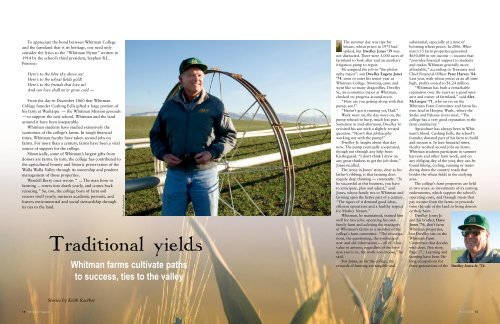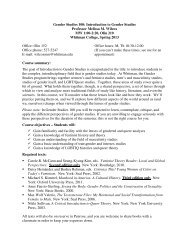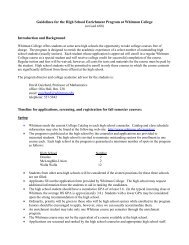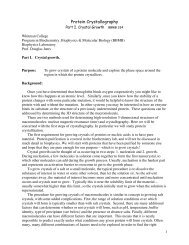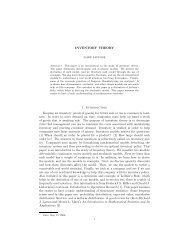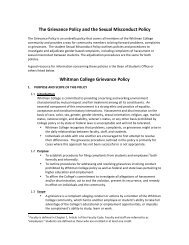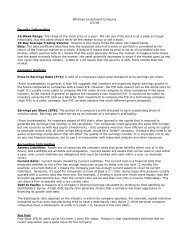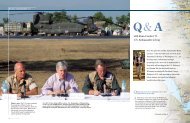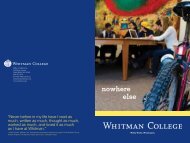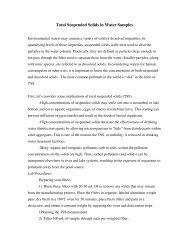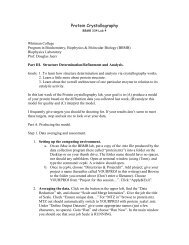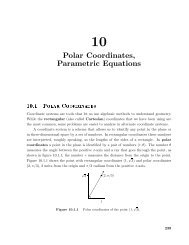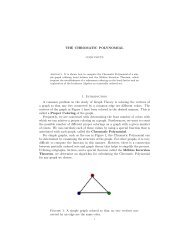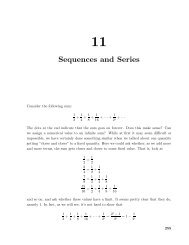Traditional yields - Whitman College
Traditional yields - Whitman College
Traditional yields - Whitman College
- No tags were found...
You also want an ePaper? Increase the reach of your titles
YUMPU automatically turns print PDFs into web optimized ePapers that Google loves.
To appreciate the bond between <strong>Whitman</strong> <strong>College</strong>and the farmland that is its heritage, one need onlyconsider the lyrics to the “<strong>Whitman</strong> Hymn” written in1914 by the school’s third president, Stephen B.L.Penrose:Here’s to the blue sky above us!Here’s to the wheat fields gold!Here’s to the friends that love us!And our love shall ne’er grow cold —From the day in December 1860 that <strong>Whitman</strong><strong>College</strong> founder Cushing Eells gifted a large portion ofhis farm at Waiilatpu — the <strong>Whitman</strong> Mission grounds— to support the new school, <strong>Whitman</strong> and the landaround it have been inseparable.<strong>Whitman</strong> students have studied extensively theeconomics of the college’s farms. In tough financialtimes, <strong>Whitman</strong> faculty have taken second jobs onfarms. For more than a century, farms have been a vitalsource of support for the college.Historically, some of <strong>Whitman</strong>’s largest gifts fromdonors are farms. In turn, the college has contributed tothe agricultural bounty and historic preservation of theWalla Walla Valley through its ownership and prudentmanagement of those properties.Wendell Berry once wrote: “ ... The man born tofarming ... enters into death yearly, and comes backrejoicing.” So, too, the college born of farm soilrenews itself yearly, nurtures academic pursuits, andfosters environmental and social stewardship throughits ties to the land.Sarah Abdurrahman<strong>Traditional</strong> <strong>yields</strong><strong>Whitman</strong> farms cultivate pathsto success, ties to the valleyThe summer day was ripe forleisure, wheat prices in 1973 hadspiked, but Dwelley Jones ’39 wasnot distracted. There were 3,000 acres offarmland to look after and an auxiliaryirrigation pump to repair.He assigned the job to “the philosophymajor”: son Dwelley Eugene Jones’74, soon to enter his senior year at<strong>Whitman</strong> <strong>College</strong>. Morning came andwent like so many dragonflies. DwelleySr., an economics major at <strong>Whitman</strong>,checked on progress around noon.“How are you getting along with thatpump, son?”“Haven’t got it running yet, Dad.”Work went on, the day wore on, thepump refused to burp, much less purr.Sometime in mid-afternoon, Dwelley Sr.revisited his son with a slightly revisedquestion. “How’s that philosophyworking out with the pump?”Dwelley Jr. laughs about that daynow. The pump eventually cooperated,though not through any help fromKierkegaard. “I don’t think I drew onany great thinkers to get the job done,”Jones recalled.The irony in Jones’ story, clear as hisfather’s ribbing, is that farming doesrequire deep thinking — constantly. “Tobe successful at this business, you haveto anticipate, plan and adjust,” saidJones, whose family ties to <strong>Whitman</strong> andfarming span the better part of a century.“The rigors of it demand good ideas,efficient operations and a healthy respectfor Mother Nature.”<strong>Whitman</strong>, he maintained, trained himwell for two jobs: operating his ownfamily farm and advising the managersof <strong>Whitman</strong>’s farms as a member of thecollege’s farm committee. “The investigations,the questioning, the synthesis ofnew and old information — all of it hasvalue to anyone, regardless of the businessyou’re in, the work you choose,” hesaid.For Jones, as for the college, therewards of farming are tangible andsubstantial, especially at a time ofbooming wheat prices. In 2006, <strong>Whitman</strong>’s15 farm properties generated$650,000 in net income — income that“provides financial support to studentsand makes <strong>Whitman</strong> generally moreaffordable,” according to Treasurer andChief Financial Officer Peter Harvey ’84.Last year, with wheat prices at an all-timehigh, profits soared to $1.24 million.“<strong>Whitman</strong> has built a remarkablereputation over the years as a good operatorand owner of farmland,” said AlexMcGregor ’71, who serves on the<strong>Whitman</strong> Farm Committee and farms hisown land in Hooper, Wash., where theSnake and Palouse rivers meet. “Thecollege has a very good reputation in thefarm community.”Agriculture has always been in <strong>Whitman</strong>’sblood. Cushing Eells, the school’sfounder, donated part of his farm to buildand sustain it. In lean financial times,faculty worked second jobs on farms.<strong>Whitman</strong> students participate in summerharvests and other farm work, and onany obliging day of the year, they can befound hiking, cycling, running or meanderingdown the country roads thatborder the wheat fields in the outlyingarea.The college’s farm properties are heldin two ways: as investments of its earningendowments, which support the school’soperating costs, and through trusts thatpay income from the farms or proceedsfrom the sale of the land to living donorsor their heirs.Dwelley Jones Jr.and his brother, DaveJones ’76, don’t farm<strong>Whitman</strong> properties,but Dwelley sits on the<strong>Whitman</strong> FarmCommittee that decideswho does. (See story,Page 17.) Learning andfarming have been lifelongoccupations forthree generations of the Dwelley Jones Jr. ’74Stories by Keith Raether14 <strong>Whitman</strong> Magazine March 2008 15
“My dad was a lifelong student of manythings. He loved history. He studiedweather voraciously. He was fascinatedby sunspot cycles and how theyimpacted agricultural production.”Jones family, a tradition that began withCharles Jones, a Walla Walla banker whoacquired most of the family’s farmland,and continued through Dwelley Jones Sr.,co-founder and a president of the WashingtonAssociation of Wheat Growers,who passed away in 1991.“My dad was a lifelong student ofmany things,” said Dwelley Jr. “He lovedhistory. He studied weather voraciously.He was fascinated by sunspot cycles andhow they impacted agricultural production.”Dwelley Sr. pioneered new farmingpractices, maintained a close associationwith scientists at Washington StateUniversity and experimented withdifferent crops. One that stuck wasgarbanzo beans, a variety of which bearsthe name Dwelley.“He was always on the forefront;there was never any status quo,” saidDwelley Jr. “His life after <strong>Whitman</strong> sortof echoed the aim of the college. He livedto learn.”Dwelley, 56, and Dave, two years hisjunior, inherited that approach — alongwith the responsibility for the family’sagricultural properties. The brothersoperate 3-D Farms under a 50-50 partnership,with help from three full-timefarmers and additional labor duringharvest.“The essence of this business is decision-making,”said Dwelley. “Whichfields will get winter wheat this year? Dowe need to pre-irrigate the ground thistime to get the crop started? Do wedirect-seed a field (seeding a crop into the— Dwelley Jones Jr. ’74previous crop’s residue with minimaldisturbance to the soil)?”Dwelley and Dave Jones have farmedfor 30 years. Both are married (Dwelleyto Julie Thomassen Jones ’79, daughterof <strong>Whitman</strong> mathematics professorRichard Thomassen; Dave to DonnaPerry Jones ’76, daughter of former<strong>Whitman</strong> President Lou Perry), and bothhave children, but there are no futurefarmers on the horizon in either family.Production methods change, <strong>yields</strong>increase with better plant materials, grainmarkets fluctuate like the weather. All ofit is food for thinking.Two years ago soft white wheat,<strong>Whitman</strong>’s main crop, yielded $5.10 abushel. McGregor thought the price sogood that he included it in a PowerPointpresentation extolling the virtues offarming. Then 2007 came in like a Lottojackpot. At the beginning of 2008, theprice of soft white wheat hit $14 abushel.Times are good for Washington’sfarmers and <strong>Whitman</strong>’s farms. ButDwelley Jones and McGregor and<strong>Whitman</strong>’s 20-odd farm managers knowbetter than to unfold the hammock.“I keep reminding myself, as my dadwould, that the day we run out of ideas isthe day we’ll be out of business,” Jonessaid. “It’s like going to class. It alwayshelped to have something in mind beforeyou got there.”WHITMAN FARMSat-a-glanceTotal Number of Farms: 15Total Tillable Acres: 16,131Original Book Value: $6,962,897Assessed Full Value in 2000: $13,135,0002007 Net Income: $1,242,0006-year Average Income: $698,000Average Price per Tillable Acre: $8502007 Value Estimate: $13,950,000Total number of bushels of wheatproduced by <strong>Whitman</strong> farms in 2007(college share): 155,400Other crops:Barley: 201 tonsDry peas: 127 tonsGreen peas: 125 tonsBushels of wheat per student103.8*How many colleges can say that?*Based on bushels of wheatproduced by <strong>Whitman</strong>farms in 2007 and fall 2007enrollment.Farm Committee oversees 22,000 acres of farmlandFarm committees at <strong>Whitman</strong> traceback to the 1930s, when farm mortgagescame into the college’s investmentportfolio. The “modern” <strong>Whitman</strong>Farm Committee took root in 1950,when <strong>Whitman</strong> President Chester Maxeyappointed a group of four local farmers— Henry Copeland, Lester Robison, EdTucker and Clarence Braden — tooversee its farm holdings.The current all-volunteer group actsas a kind of professional managementteam for <strong>Whitman</strong>’s extensive farmassets. Members tour all 15 <strong>Whitman</strong>farm properties twice a year. They decidewhen to sell crops and who to hire tomanage each property. They approveleases (executed by attorney andcommittee member Jim Hayner ’72).“The people on our committee arefarmers who know the business insideand out,” said Pete Reid ’49, assistant to<strong>Whitman</strong> President George Bridges andoverseer of <strong>Whitman</strong>’s farm interests.“They’re current on everything fromfertilizer rates to weed control. Youknow, they think a lot like the collegedoes — creatively, innovatively.”The congruence should come as nosurprise. Fourteen of the 18 farmcommittee members are graduates of<strong>Whitman</strong>. Two of them — Hayner andDave Wyckoff ’67 — are also trustees ofthe college. Wyckoff, who farms inProsser, is in his second year ascommittee chair.The committee oversees a combined22,000 acres of farmland stretching overfour counties: Walla Walla, Umatilla,Garfield and Columbia. “It’s been a verydynamic process,” said Alex McGregor’71, a history major at<strong>Whitman</strong> (and visitingassistant professor ofhistory 1977-78), whoowns McGregorCompany, a fertilizerand farm supply firmwith 42 outlets inAlex McGregorWashington, Idahoand Oregon. “Thecommittee and the college, I think, havebeen wise in their judgment not to tellpeople how to farm but rather to choosetalented, knowledgeable people and letthem make informed decisions.”The core committee works closelywith Reid and Treasurer and Chief FinancialOfficer Peter Harvey ’84, ex-officiomembers of the group, on everythingfrom soil conservation to lease agreements.Most of the 15 leases call for thefarm manager to receive 60 percent of thecrop and the college to take 40 percent.For drier properties, the split is 67percent for the farmer and 33 percent for<strong>Whitman</strong>. On the low-yield Braden property,the college receives only 28 percentof the crop, but 65 wind turbines on theproperty generated nearly $100,000 inrevenue in 2007 and enough electricity tosupply a campus the size of <strong>Whitman</strong>.“It’s a harmonious arrangement,”McGregor said. “If you find dedicatedpeople who care — and <strong>Whitman</strong> has astrong record of that in all areas of itsoperation — strong partnerships occurnaturally, and you come to see how valuablethey are to the success of everythingyou do.”<strong>Whitman</strong> Farm Committee 2007-08Dave Wyckoff ’67 (Chair)Bob DanforthDennis Davin ’56Jack FredricksonJim Hayner ’72Dwelley Jones ’74Frank Lamb ’62Don Lieuallen ’58Alex McGregor ’71Walter Minnick ’64Merlin Phillips ’32 (Emeritus)Anne-Marie Zell Schwerin ’85Mark Vogler ’74Paul Webb ’40Jerry ZahlEx-officio membersGeorge Bridges, president, <strong>Whitman</strong><strong>College</strong>Peter Harvey ’84, treasurer and chieffinancial officerPete Reid ’49, assistant to the president<strong>Whitman</strong> has been in the farming businesssince the early 1930s, when farms becamea part of the college’s portfolio. Thisundated historic photo was shot by Dr.Elizabeth Welty, a member of the <strong>Whitman</strong><strong>College</strong> Board of Trustees.16 <strong>Whitman</strong> Magazine March 2008 17


